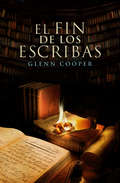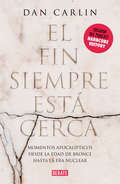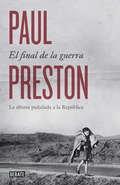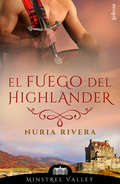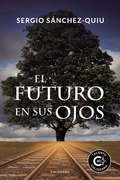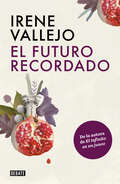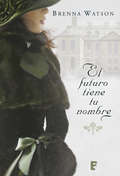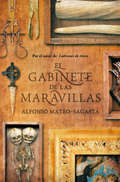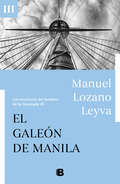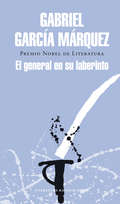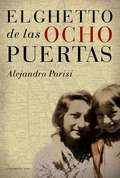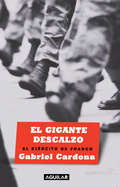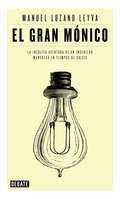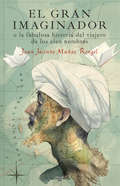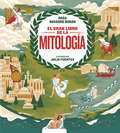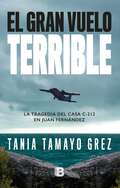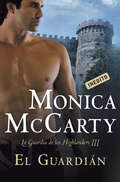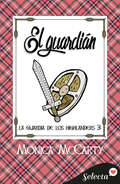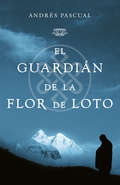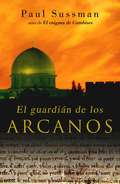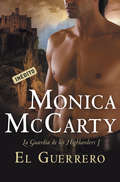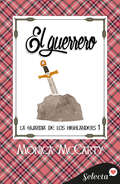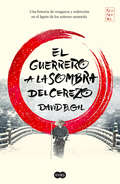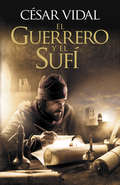- Table View
- List View
El fin de los escribas (La biblioteca de los muertos #Volumen 3)
by Glenn CooperLa fecha del fin del mundo se acerca. La población teme ver cumplida la profecía de la abadía de Vectis. Algunos, sin embargo, conservan la esperanza. ¿Es posible alterar el curso del destino? Año 2026. Mientras la humanidad se acerca a la fatídica fecha del fin del mundo, el hijo del ex agente del FBI Will Piper desaparece en pos de una joven que afirma tener una información que podría cambiar el destino: no todos los escribas habrían muerto en el suicidio colectivo de la abadía de Vectis... Glenn Cooper, el autor que revolucionó el género del thriller histórico con La biblioteca de los muertos y El libro de las almas, nos brinda ahora un espléndido y perturbador desenlace. El fin de los escribas es el broche de oro a una trilogía que ha fascinado a millones de lectores en todo el mundo. Reseñas:«GlennCooper se merece un éxito más sonado que el de Dan Brown.»Corriere della Sera «A medida que Cooper va tejiendo las distintas capas de la intriga uno comprende que no se trata de un thriller al uso, sino de una obra que nos plantea grandes preguntas. Apasionante.»Sunday Telegraph
El fin siempre está cerca: Los momentos apocalípticos de la historia desde la Edad del Bronce hasta la era nuclear
by Dan CarlinDan Carlin, el creador del podcast de historia más famoso de todos los tiempos, nos embarca en un excepcional viaje en el tiempo para convertir el pasado en la clave de nuestro turbio presente. ¿Los tiempos difíciles hacen más duras a las personas? ¿Podemos manejar el poder de nuestras armas o estamos condenados a autodestruirnos? ¿La tecnología y las capacidades humanas seguirán desarrollándose o pueden llegar a un punto máximo o incluso retroceder? ¿Estamos condenados a desaparecer? Nadie tiene respuestas para semejantes preguntas, pero solo Dan Carlin, el creador del monumental y multipremiado podcast Hardcore History, tiene la capacidad de abordarlas de una forma tan genial. El fin siempre está cerca es un relato fascinante y transgresor sobre el auge y la caída de las civilizaciones que nos obliga a revisar todo lo quecreíamos saber sobre la historia y a reconsiderar lo que parecían fantasías: nada nos impide sufrir el mismo destino que nuestros antepasados. ¿Se convertirá nuestro mundo en ruinas para que los futuros arqueólogos las desentierren y exploren? Los planteamientos de Carlin, repletos de cuestiones filosóficas y de hipótesis a partir del ayer, recuerdan a los mejores episodios de La dimensión desconocida. Aventurándose en un maravilloso compendio de historias apocalípticas que enganchan de principio a fin y que giran en torno a un solo eje -el de la supervivencia humana-, Dan Carlin rompe todos los moldes y nos embarca en un excepcional viaje en el tiempo que busca convertir el pasado en la clave de nuestro turbio presente.
El final de la guerra: La última puñalada a la República
by Paul PrestonEsta es la historia de una tragedia evitable que costó muchos miles de vidas y arruinó decenas de miles más. Tiene numerosos protagonistas, pero se centra en tres individuos. El primero, el doctor Juan Negrín, víctima de lo que se podría llamar una conjura de necios, trató de impedirla. Los otros dos fueron responsables de lo acontecido. Uno, Julián Besteiro, actuó con una asombrosa ingenuidad. El otro, Segismundo Casado, con una sorprendente combinación de cinismo, arrogancia y egoísmo. El resultado fue una catástrofe humanitaria y el peor final posible para la tragedia que fue la guerra de España.
El fuego del highlander
by Nuria RiveraEl viaje para recuperar su honor puede hacer que pierda algo más que el corazón. Una historia de amor en la época de la regencia.Para todos los seguidores de la exitosa serie «Minstrel Valley», llegan las historias de sus personajes secundarios. Angus McDonald se marcha con su padre de su pueblo natal en Escocia en busca de una espada legendaria de su familia que ha desaparecido y los acusan de robarla. Con ella restituirán la ofensa de honor que han sufrido. Casi diez años después está instalado en Minstrel Valley, su padre ha muerto y es dueño de la forja del pueblo. Meribeth Campbell escapa de Londres con su hermana huyendo de su tío. Un percance en el camino la lleva a Minstrel Valley, allí buscará un herrero para que arregle una espada que encontró entre las pertenencias de su padre. Angus y Meribeth se conocen por casualidad y la atracción salta entre ellos, pero cuando él descubre que ella tiene en su poder la reliquia de su familia, hará cualquier cosa para que lo acompañe a Escocia y confirme su inocencia. Sellan una alianza de ayuda mutua sin saber que ese viaje los pondrá a prueba, que el destino entrecruza algunas vidas y los obligará a tomar decisiones inesperadas. Sin embargo, cuando la codicia y la envidia pone en peligro algo tan sagrado como el honor, Angus no está dispuesto a perder de nuevo, aunque eso lo lleve a arriesgar algo más que el corazón.
El fueguino
by Arnoldo CancliniEn 1830, el capitán Robert FitzRoy llevó a Inglaterra, a bordo de la nave Beagle, a cuatro indios de los canales fueguinos para civilizarlos y darles formación religiosa. Esta es quizá la historia más conocida sobre los habitantes de Tierra del Fuego, en especial con relación a Jemmy Button, hoy casi un mito. También es sabido que al cabo de un corto tiempo los indios volvieron a su tierra, aunque nunca se difundió claramente qué pasó con ellos en Europa. Menos imaginable aún es todo lo que sucedió como consecuencia de aquel episodio que iniciara la verdadera historia de Tierra del Fuego. El relato de cómo reaccionaron aquellos primeros personajes y el de sus acciones posteriores constituye una trama de encuentros y desencuentros, salvajes y europeos, amor y crimen, perdón y sufrimiento. Lo que ocurrió entre indígenas, marinos, religiosos, militares, hombres, mujeres, jóvenes y ancianos produce una narración que adquiere ribetes de leyenda, pero que es el resultado de una minuciosa investigación. Más allá del propio Jemmy Button, El fueguino retrata la vida y la psicología de su raza y el ciclo completo de los hechos que lo rodearon. De este modo, su historia adquiere un sentido revelador que jamás hubieran imaginado el navegante FitzRoy ni sus protegidos. Increíblemente, esta historia nunca había sido tratada en profundidad. Con el rigor que lo caracteriza, Arnoldo Canclini logra la proeza de transmitirla. A sus reconocidos méritos como investigador y a la exactitud de los detalles, añade esta vez una admirable destreza narrativa para recrear con vivacidad cada uno de los episodios de esta peculiar saga. El fueguino se convierte así en la primera novela histórica escrita en la Argentina sobre sus regiones más australes. Solapa 1: Arnoldo Canclini nació en La Plata en 1926 y se graduó como doctor en Filosofía y Letras en la UBA en 1953. Luego, mientras desarrollaba su trayectoria literaria, se desempeñó como pastor evangélico bautista por varias décadas. Atraído por el tema de las misiones, en 1942 publicó su primer libro, Madagascar, el país y las misiones, y desde entonces ha escrito más de cincuenta títulos sobre temas religiosos e históricos, especializándose en el ámbito patagónico. En este campo podemos mencionar: Hasta lo último de la Tierra (1951) y Cómo fue civilizado el Sur patagónico (1977), cinco biografías de misioneros en la Patagonia (1970-1980), además de Historia de Tierra del Fuego (1980), Tierra del Fuego: su historia en historias (1986), Julio Popper, Quijote del oro fueguino (1992), entre otros; también fue coordinador del Libro del Centenario de la ciudad de Ushuaia. Forma parte de diversas instituciones como la Academia Nacional de la Historia, de la que es miembro correspondiente por Tierra del Fuego y para la que actualmente está trabajando en el proyecto de historias regionales, a cargo de lo referido a la zona austral. Además pertenece al Instituto de las Malvinas y Tierras Australes Argentinas y ha recibido un doctorado honoris causa en teología. Es casado, tiene dos hijos y cuatro nietos.
El futuro en sus ojos
by Sergio Sánchez-Quiu¿Hasta dónde pueden llegar el valor y el amor de una hermana? Decisión. Valentía. Lealtad. Núria vive presa en un entorno rural que oprime su alma aventurera. Un viajero que se dirige a la prometedora Barcelona de 1924 le abrirá la posibilidad de huir también en busca de sus propios sueños. Clara es una joven granadina que, a finales de 1975, viajará a Barcelona en auxilio de sus tíos, huérfanos de descendencia. Pronto, olvidará sus reniegos iniciales y se rendirá a los encantos de la ciudad. Mario es descarado pero comprometido: lucha junto a otros estudiantes por la reinstauración de la democracia. Durante las manifestaciones por la amnistía de 1976 vivirá un encuentro inesperado que le hará replantear sus prioridades. Cuando Margarida intuye que su hermana, Núria, atraviesa dificultades, no duda en ir a su encuentro. Por primera vez se separará de su familia, dando inicio a un viaje de complicado retorno a la ciudad que las atrapará para siempre.
El futuro recordado
by Irene Vallejo«Los libros de Irene Vallejo, claros e inteligentes, se leen muy bien e invitan a pensar. En la mejor línea humanista.» -CARLOS GARCÍA GUAL La aparente contradicción que da título a este libro es la premisa central de los breves ensayos que contiene: la certeza de que en cada paso que damos está la huella de un mundo que parece haberse quedado atrás en el tiempo, pero que vive y respira en cada uno de nuestros gestos e ideas. En estos ensayos, Irene Vallejo entabla un diálogo con diversas personalidades de la historia y con la cultura que nos han legado; son al mismo tiempo un derroche de erudición sin pretensiones y un homenaje al sutil arte de contar historias. De la filosofía a la geografía, de la literatura a los deportes, de la historia a la vida cotidiana, estos ejercicios narrativos son pistas que nos ayudan a comprender mejor el mundo que habitamos y nos reconcilian con la memoria de aquellos que, antes que nosotros, se hicieron las mismas preguntas que hoy nos mueven.
El futuro tiene tu nombre
by Brenna Watson¿Y si tu marido fuese tu peor enemigo? ¿Y si ni siquiera su muerte te librara de él? Cuando el barón Hamilton fallece de forma inesperada, su viuda, la joven Marian Fillmore, cree que por fin se verá libre de un esposo abusivo y maltratador. Sin embargo, las condiciones que establece en su testamento la obligan a permanecer atada a un lugar al que odia y a su cuñada, tan cruel y déspota como su hermano. La llegada del hijo del barón, procedente de América, será la única luz de esperanza en el porvenir de Marian. Solo él será capaz de cambiar su destino y el de las personas a las que ama, aunque el precio a pagar será demasiado alto. Porque, ¿hasta dónde es lícito sentirse atraída por el hijo de su difunto marido?
El gabinete de las maravillas (Isidoro Montemayor #Volumen 2)
by Alfonso Mateo-SagastaMadrid, otoño de 1614. Gonzalo Escondrillo, archivero del marqués de Hornacho, ha aparecido muerto en extrañas circunstancias en el gabinete de las maravillas, orgullo de la casa del marqués y su tesoro mejor custodiado. Entre otros objetos valiosos y extraordinarios, la colección cuenta con colmillos de elefante, una armadura del rey Carlos, cuadros de maestros italianos y flamencos, la piel de un oso polar e, incluso, prodigios insólitos como un cuerno de unicornio, un niño con dos cabezas, la mano de una sirena y el pezón de una santa. Tras el caso del Quijote apócrifo, Isidoro Montemayor es el encargado de investigar su muerte. Todo apunta a que se trata de un intento de robo pero ¿qué se han llevado? ¿Qué esconde el gabinete de las maravillas? ¿Qué o a quién buscaba el asesino?«El buen hacer de Isidoro Montemayor, su vis cómica, sus amoríos, su valor, su heroica villanía nos conducen por el lado ameno de la narración, trufada de multitud de anécdotas y deun humor elegante que, en ocasiones, nos hará desternillarnos.» Juan Bolea
El galeón de Manila (Las aventuras del hombre de la Ensenada #Volumen II)
by Manuel Lozano LeyvaUna extraordinaria novela marítima sobre la persecución del galeón anual de Manila a Acapulco. En 1755, el rey destronado de Champa firma una alianza con piratas holandeses para asaltar un galeón español colmado de tesoros. La precariedad de sus sistemas defensivos será un reclamo para los piratas y el ejército cham, un pueblo de expertos navegantes que piratean por los mares orientales esperando la ocasión de recuperar las tierras que les fueron arrebatadas. El viejo, lento y pesado mastodonte surcará los mares vigilado por una goleta holandesa y cuatro veloces juncos cham que, durante meses, acosarán al busque español esperando el momento para atacar. Los piratas saben que el tiempo juega a su favor, que las enfermedades y las calamidades propias de las largas travesías junto con el asedio psicológico, desgastará la moral de la tripulación. Además, una serie de asesinatos sembrarán el terror en el galeón español. El enemigoes sigiloso e invisible. Con la ayuda de Álvaro de Soler idearán estratagemas infalibles para repeler el asedio en alta mar y proteger sus tesoros.
El general en su laberinto
by Gabriel García MárquezGarcía Márquez retrata con pulso magistral la figura de Simón Bolívar, que transmutó el destino de América. Aclamado por el pueblo como Libertador, blanco de numerosas conjuras políticas y militares, héroe romántico y hasta libertino para sus detractores y sus partidarios, idealista íntegro y abandonado que contempla las ruinas de su sueño de unidad de los pueblos americanos, tras la independencia del dominio español Simón Bolívar emprende -enfermo, con un menguado séquito- el que será su viaje final. Parte desde Bogotá para seguir el curso del río Magdalena. Su viaje será el último en un doble sentido: le proporciona oportunidades para considerar los pasos que ha dado en su agitada vida y, al tiempo, la gravedad de sus dolencias apresta en varios meses su encuentro con la muerte. El pulso magistral de Gabriel García Márquez refiere hasta en sus detalles mínimos la inmensa aventura que, impulsada por la voluntad de Bolívar, transmutó el destino de América. «José Palacios, su servidor más antiguo, lo encontró flotando en las aguas depurativas de la bañera, desnudo y con los ojos abiertos, y creyó que se había ahogado. Sabía que ése era uno de sus muchos modos de meditar, pero el estado de éxtasis en que yacía a la deriva parecía de alguien que ya no era de este mundo. No se atrevió a acercarse, sino que lo llamó con voz sorda de acuerdo con la orden de despertarlo antes de las cinco para viajar con las primeras luces.» Rafael Conte dijo... «Quizá en la prosa narrativa de la literatura hispanoamericana actual no haya más que dos cumbres, Jorge Luis Borges y Gabriel García Márquez, que han sido dos verdaderos refundadores del arte narrativo en español de nuestro tiempo.»
El ghetto de las ocho puertas
by Alejandro Parisi"Suspenso, lucidez, terror, ternura. La estremecedora odisea de una mujer inolvidable." Jorge Fernández Díaz Esta no es sólo la historia de un sobreviviente del ghetto de Varsovia. Es una muestra de lo que el Hombre puede llegar a hacer para sobrevivir a su época. La historia de esta heroína puede parecer inverosímil por momentos, su valor y su astucia demasiado asombrosos para ser reales.Mira Ostromoglinska nació en una familia judía polaca, en 1922. Por un pacto de silencio calló su historia por más de cincuenta años. Hasta que un día al fin decidió contar por primera vez, y con una lucidez inquietante, cómo escaparon del horror del ghetto por las cloacas y cómo se organizaron para no claudicar frente al exterminio nazi.Alejandro Parisi la entrevistó a lo largo de un año. El ghetto de las ocho puertas es el resultado de ese maravilloso trabajo. El autor captó con destreza la voz de su protagonista, narra con tono justo y sutil, y retrata con maestría aquellos años en Europa.El ghetto de las ocho puertas es a la vez una novela y el relato de una vida desbordante, de una experiencia conmovedora.
El gigante descalzo: El ejército de Franco
by Gabriel CardonaEl ejército de Franco por dentro. Durante el franquismo, el Ejército concentraba las mayores reservas de poder aunque solo ejercía bajo la batuta del dictador. La enorme organización era arrolladora en el interior y tigre de papel en el extranjero y, bajo su imponente y uniforme apariencia, escondía un mundo desordenado y empobrecido. Durante el mandato de Franco, se sucedieron tres generaciones distintas de militares, el principal modelo de referencia evolucionó desde el alemán al norteamericano y toda la sociedad española se transformó profundamente.
El gran Mónico: La insólita aventura de un ingeniero manchego en tiempos de crisis
by Manuel Lozano LeyvaLa fabulosa e instructiva historia del ingeniero e inventor Mónico Sánchez, que saliendo de la miseria terminó conquistando Nueva York. «En resumen, lo que pretendo con este relato no es acercarme al alma de Mónico Sánchez Moreno ni al detalle academicista de su historia, sino algo mucho más sencillo a la vez que ambicioso: animar a nuestros jóvenes desesperanzados en esta época de crisis del sur de Europa, en particular, por razones obvias, a los españoles. A ellos va dirigido este librito, para que vean que en condiciones enormemente más adversas que las actuales, es posible no sólo salir adelante, sino llevar a cabo proezas admirables y a priori imposibles para el bienestar propio y del país. O sea, que el (supuesto) destino es siempre evitable.» Manuel Lozano Leyva
El gran imaginador o la fabulosa historia del viajero de los cien nombres
by Juan Jacinto Muñoz RengelEl autor de El asesino hipocondríaco consolida su trayectoria con esta ambiciosa novela en la que aúna con sorprendente originalidad lo fantástico con lo histórico, y el humor con el terror y la aventura. Un delicioso homenaje a la propia literatura con un protagonista inigualable. Esta es la historia del mayor imaginador de todos los tiempos, cuya vida acabará por convertirse en su gran obra maestra... Atenas, siglo XVI. Nikolaos Popoulos ha nacido dotado con una capacidad de ensoñación más allá de los límites de la naturaleza. Su verdadera vocación es ser escritor. Pero, como perseguido por una maldición, ve una y otra vez truncados sus planes, mientras es arrastrado a un épico viaje a los orígenes de la fábula y la ficción. Conocerá a legendarios corsarios y a los asombrosos piratas uscoques; se tropezará con la Condesa Sangrienta y con el gólem de Praga, inspiradores de los mitos de Drácula y del monstruo de Frankenstein, y trabará una íntima amistad con Miguel de Cervantes, antes de que se convierta en el genio más famoso de las letras universales. Pero ¿logrará al fin escribir una obra digna de su imaginación ilimitada? En el cuarto centenario de Cervantes, Juan Jacinto Muñoz Rengel vuelve a sorprender con una historia llena de fantasía, humor, aventura y homenajes literarios protagonizada por un estrambótico personaje que tiene una imaginación sin límites y que hará las delicias de cualquier amante de la literatura. Reseñas:«Juan Jacinto Muñoz Rengel sorprende con El gran imaginador, una novela llena de fantasía, humor y homenajes literarios.»Babelia, El País «Un sentido homenaje a la literatura y a la imaginación.»El Cultural, El Mundo «Espléndida. Gracias a la lectura apasionante de esta novela de Muñoz Rengel sabemos mucho más.»Juan Francisco Ferré, Diario Sur «Muñoz Rengel viaja en el tiempo al siglo XVI para escribir una novela que, con un gran despliegue de imaginación y fantasía, rinde un homenaje a la creación literaria y, de paso, a Cervantes.»Xesús Fraga, La voz de Galicia «Juan Jacinto acaba de cazar la historia de su vida con El gran imaginador. (...). Ha ido creciendo desde la distancia corta de los relatos hasta la mirada telescópica de su gran imaginador.»Antonio Javier López, Diario Sur «Una novela total. Con un argumento que hubiese gustado, sospecho, a Borges.»Vicente Araguas, revista Leer «Quien se aventure a leer esta novela (...) disfrutará de su historia más ambiciosa hasta el momento y de un protagonista que tiene los elementos necesarios para pasar a la posteridad. (...) La grandeza de esta obra es su capacidad de sorprender al lector.»Esther Magar, Librosyliteratura.com «Popoulos es un Funes que lo imagina todo.»EÑE «Muñoz Rengel está enfermo de imaginación. Esa vieja enfermedad que hermana a Borges y a Italo Calvino, a Bram Stoker y a Mary Shelley, a Lovecraft y a Wells, al propio Nikolaos Popoulus y a Cervantes.»Guillermo Busutil, Mercurio «Una vindicación de la ficción y la inventiva en los tiempos de las autobiografías prematuras y la no ficción.»Antonio G. Maldonado, El Asombrario «No queda otra salida más que rendirse ante una magnífica prosa y a la personalidad arrolladora de este gran imaginador.»Antonio Parra Sanz, La Verdad «Hay que ser especial para plantear una novela sobre la imaginación infinita y hay que ser un genio para escribirla sin defraudar.»Revista Experpento «Un viaje a las raíces de la literatura fantástica.»Diario de Sevilla «Quienes esperaban el órdago definitivo de Muñoz Rengel quedarán satisfechos. Borges habría entregado la cuchara por parir esta novela.»Pablo Bujalance, Málaga Hoy</P
El gran libro de la mitología
by Rosa Navarro¿Te imaginas una diosa que nace cuando cae sangre de su padre sobre el mar? ¿Y un mundo en el que la prisión está en el centro de la tierra? El universo de la mitología griega está repleto de leyendas que jamás hubieras imaginado. Los dioses dominan el cielo y la tierra, incluso el inframundo, donde vagan los muertos. Son dueños del destino de los humanos y a veces juegan con nosotros, pero los mueven las mismas pasiones. Rosa Navarro selecciona los mitos imprescindibles.
El gran vuelo terrible
by Tania Tamayo GrezInvestigación periodística que indaga las razones del accidente sufrido por el Casa 212 que llevaba una tripulación civil a la isla Juan Fernández, entre ellos, al animador Felipe Camiroaga y al director de Levantemos Chile, Felipe Cubillos, tragedia que remeció al país. El viernes 2 de septiembre de 2011 se precipitó al mar el avión de la Fach cuyo nombre de combate era Pegaso. Los 21 pasajeros que iban en el vuelo llevaban ayuda a la isla para colaborar en las tareas de reconstrucción luego del terremoto y tsunami de 2010. Todos murieron. Las causas nunca fueron claras: una nave militar trasladó como carga a 21 pasajeros civiles y se cometieron una serie de irregularidades y negligencias que ahora, en este libro, salen a la luz.
El guardián (La guardia de los Highlanders #Volumen 3)
by Monica McCartyEl tercer libro de la serie de La Guardia de los Highlanders. Una pasión en territorio enemigo. Arthur «el Guardián» Campbell destaca por su destreza para seguir rastros, la agudeza de sus sentidos y su capacidad de fundirse con la oscuridad. Es el espía perfecto y el rey Bruce tiene un encargo para él: debe infiltrarse en el clan cuyo jefe asesinó a su padre. Con el corazón sediento de sangre, Arthur comenzará la misión sin saber que el mayor obstáculo al que deberá enfrentarse será la hija de su enemigo mortal, una dulce sirena de cabellos de miel cuya mayor habilidad es detectar el rastro del engaño. Intrigada por el apuesto y rudo recién llegado, Anna McDougall no puede evitar sentirse atraída por esos ojos que la devoran y parecen contradecir a las palabras. Cuando el peligro, la traición y la sombra de la guerra se cierna sobre ellos, el Guardián deberá tomar la decisión más importante a que se ha enfrentado su corazón: ¿el amor o la venganza?
El guardián (La guardia de los Highlanders #Volumen 3)
by Monica McCartyEl tercer libro de la serie de La Guardia de los Highlanders. Una pasión en territorio enemigo. Arthur «el Guardián» Campbell destaca por su destreza para seguir rastros, la agudeza de sus sentidos y su capacidad de fundirse con la oscuridad. Es el espía perfecto y el rey Bruce tiene un encargo para él: debe infiltrarse en el clan cuyo jefe asesinó a su padre. Con el corazón sediento de sangre, Arthur comenzará la misión sin saber que el mayor obstáculo al que deberá enfrentarse será la hija de su enemigo mortal, una dulce sirena de cabellos de miel cuya mayor habilidad es detectar el rastro del engaño. Intrigada por el apuesto y rudo recién llegado, Anna McDougall no puede evitar sentirse atraída por esos ojos que la devoran y parecen contradecir a las palabras. Cuando el peligro, la traición y la sombra de la guerra se cierna sobre ellos, el Guardián deberá tomar la decisión más importante a que se ha enfrentado su corazón: ¿el amor o la venganza?
El guardián de la flor de loto
by Andrés PascualUna novela trepidante, una carrera contrarreloj a través de los más exóticos y desconocidos parajes del continente asiático, una aventura espiritual sin precedentes. Faltan pocas horas para que el lama Lobsang Singay desvele al mundo las claves que revolucionarán la medicina. Tras años de investigación en su monasterio, Singay ha logrado aunar los avances científicos de Occidente con la sabiduría ancestral de los chamanes tibetanos. Sin embargo, poco antes de impartir la tan esperada conferencia en la Universidad de Harvard, el médico muere en extrañas circunstancias. Jacobo, un joven español inmerso en una crisis personal y profesional, se ve empujado a investigar qué hay detrás de esa misteriosa muerte. La respuesta podría estar en un tratado milenario que una secta budista y los servicios de inteligencia del ejército chino ansían poseer. Para encontrarlo, Jacobo emprende un vertiginoso viaje por las inaccesibles cumbres del Himalaya, desde el norte de la India hasta las profundidades del legendario Tíbet. Al tiempo que sortea los peligros que le acechan, de la mano de su maestro Gyentse aprenderá que ese universo mágico también alberga la solución a sus propios conflictos. El guardián de la flor de loto cuenta ya con más de 100.000 lectores. La crítica ha dicho...«Una novela que arrastra al lector sin descanso a lo largo de más de 400 páginas, al tiempo que le transmite la serenidad del budismo tibetano, sus colores y su magia.»Noticias de La Rioja
El guardián de los arcanos
by Paul SussmanUn objeto sagrado celosamente guardado durante siglos puede cambiar la historia actual de Oriente Próximo. Con más de 150.000 ejemplares vendidos de su thriller arqueológico El enigma de Cambises, llega la nueva novela del escritor Paul Sussman. Año 70 de nuestra era. Tras días de asedio, las legiones romanas del general Tito irrumpían en el sagrado templo de Jerusalén, aniquilando a los últimos resistentes de una revuelta condenada al fracaso y saqueando todos sus tesoros. Solo un hombre y un objeto escaparon al pillaje. Dos milenios después, el hallazgo del cadáver de un anciano europeo en una necrópolis egipcia y una carta anónima, con la fotocopia de un manuscrito medieval indescifrable, ponen a un inspector egipcio, una periodista palestina y un policía israelí sobre la pista de un misterio de tal fuerza simbólica que podría desatar una espiral de violencia en Oriente Próximo. Una aventura fascinante, una intriga decandente actualidad.
El guerrero (La guardia de los Highlanders #Volumen 1)
by Monica McCartyEl primer libro de la serie de La Guardia de los Highlanders. Las mejores alianzas nacen entre las sábanas... Nadie en toda la nación maneja la espada como Tor MacLeod. Es un hombre independiente, que se debe a su clan y jamás ha rendido cuentas a nadie... y mucho menos a su nueva esposa, fruto de un pacto para atraerlo a la unidad de guerreros más letal de Escocia. La muchacha que se ha colado en su cama quizá haya obtenido su mano, pero nunca tendrá su corazón. Christina Fraser está convencida de que bajo el brutal caparazón de Tor se esconde una persona amable. Por ahora, el único calor está en los momentos de pasión y gloria que comparten en la cama y desaparecen al alba. Sin embargo, cuando esté a punto de estallar la guerra contra Inglaterra, Christina caerá en una trampa mortal y Tor se enfrentará a la batalla definitiva: salvar a su esposa y abrir su corazón antes de que sea demasiado tarde.
El guerrero (La guardia de los Highlanders #Volumen 1)
by Monica McCartyEl primer libro de la serie de La Guardia de los Highlanders. Las mejores alianzas nacen entre las sábanas... Nadie en toda la nación maneja la espada como Tor MacLeod. Es un hombre independiente, que se debe a su clan y jamás ha rendido cuentas a nadie... y mucho menos a su nueva esposa, fruto de un pacto para atraerlo a la unidad de guerreros más letal de Escocia. La muchacha que se ha colado en su cama quizá haya obtenido su mano, pero nunca tendrá su corazón. Christina Fraser está convencida de que bajo el brutal caparazón de Tor se esconde una persona amable. Por ahora, el único calor está en los momentos de pasión y gloria que comparten en la cama y desaparecen al alba. Sin embargo, cuando esté a punto de estallar la guerra contra Inglaterra, Christina caerá en una trampa mortal y Tor se enfrentará a la batalla definitiva: salvar a su esposa y abrir su corazón antes de que sea demasiado tarde.
El guerrero a la sombra del cerezo
by David B. GilUna historia de venganza y redención en el Japón de los señores samuráis. El guerrero a la sombra del cerezo fue finalista al Premio Fernando Lara del Grupo Planeta y ganadora del Premio Hislibris de Novela Histórica. Japón, finales del siglo XVI. El país deja atrás la Era de los Estados en Guerra y se adentra en un titubeante periodo de paz. Entre las víctimas del largo conflicto se halla Seizo Ikeda, único superviviente del clan regente de la provincia de Izumo, huérfano a los nueve años tras el exterminio de su casa. Hostigado por los asesinos de su familia y condenado al destierro y al olvido, inicia un largo peregrinaje al amparo de Kenzaburo Arima, último samurái con vida del ejército de su padre, convertido ahora en su mentor. En el otro extremo del país, Ekei Inafune, un médico repudiado por aplicar las artes aprendidas entre los bárbaros llegados de Occidente, se veimplicado en una conjura urdida a la sombra de los clanes más poderosos del país. Una conspiración capaz de acabar con el frágil periodo de calma que da comienzo. Una novela cruda y bella, cargada de matices, que nos hace viajar a través de un Japón devastado por más de dos siglos de guerra, entre cuyas cenizas, sin embargo, florecen los más hermosos cerezos. Reseña:«Un viaje inolvidable a una época llena de poesía, misterio y crueldad.»Toni Hill Los lectores opinan...«Uno de esos libros que dejan huella en tu vida y a los que recurres cuando todo lo demás falla.» «Te hace recuperar el placer de las novelas de aventuras inolvidables.» «Hay detalles en la trama llenos de elegancia y con una sutileza exquisita. Un libro excelente.» «Te transporta a otra época y otro mundo, no quieres que acabe nunca.» «Precioso, conmovedor, con una prosa como hacía tiempo que no encontraba.» «Desde que leí Shogun, de Clavell, no había vuelto a encontrar un libro de samuráis que me gustase.» «Una historia conmovedora e intrigante que no puedes parar de leer. De las novelas que apetece recomendar.»
El guerrero y el sufí
by César VidalEn vísperas de una de las batallas más célebres de la historia de Occidente, cinco vidas confluyen irremediablemente. Ahmad, el joven almohade procedente del Magrib, sueña con las recompensas que recibirá por llevar el yihad contra los infieles. Alfonso VIII, rey de Castilla, intenta encontrar una forma de evitar los ataques por la espalda de los otros reyes cristianos y enfrentarse a los almohades con perspectivas de éxito. Rodrigo abandona sus tierras para enfrentarse a aquellos a los que considera peligrosos invasores. Raquel piensa en la manera de ayudar a los otros judíos a sobrevivir en medio de un choque entre pueblos distintos del suyo. Y Abdallah redacta, tranquila y meticulosamente, un libro dedicado a un tema extraño, desconocido y esotérico que, a su juicio, resulta esencial en los tiempos que le ha tocado vivir. César Vidal nos sumerge en un mundo marcado por la intolerancia religiosa, el afán de conquista, la búsqueda de la sabiduría y el amor a la belleza, al tiempo que explora aspectos muy poco conocidos del pensamiento islámico.
